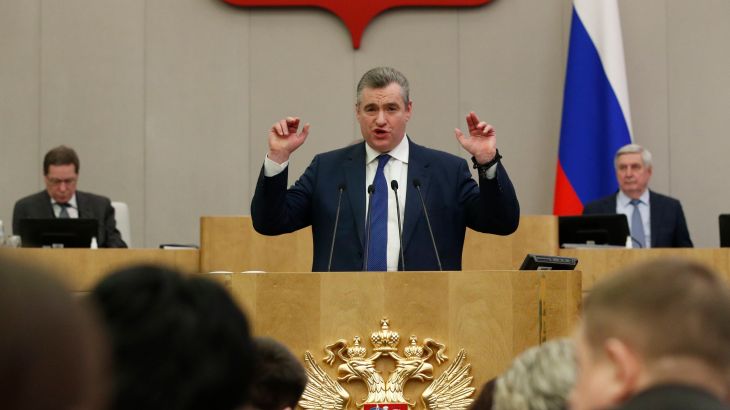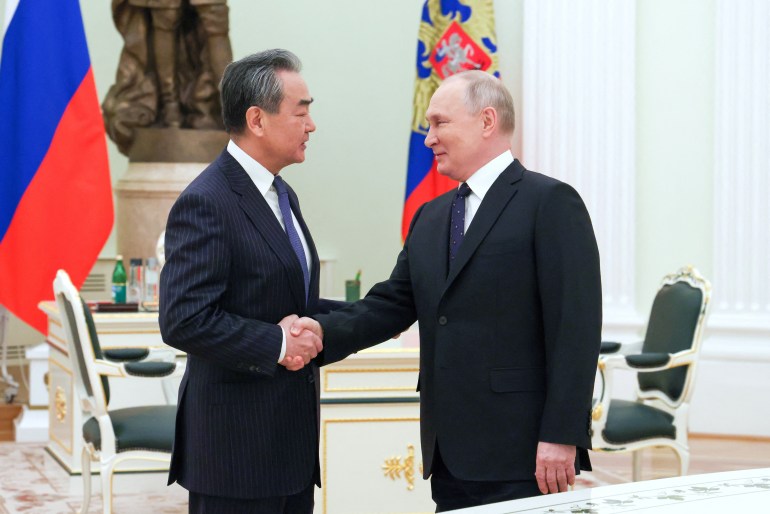Nuclear war no closer despite treaty move, Russian official says
Despite its decision to suspend participation in the New START arms reduction treaty, Russia says it will keep abiding by its restrictions.

Moscow’s decision to suspend its participation in the New START arms reduction treaty with the United States does not increase the risk of a nuclear conflict, Russia’s deputy foreign minister says.
Sergei Ryabkov said on Wednesday it would be up to Russian President Vladimir Putin to determine whether Moscow could return to the pact, Russia’s Interfax news agency quoted him as saying.
Keep reading
list of 4 itemsBiden rallies behind Kyiv as Putin freezes nuclear deal with US
Xi Jinping to visit Moscow for summit with Putin: Report
What is the New START nuclear deal and why did Russia suspend it?
His comments came after Putin announced on Tuesday he is freezing Moscow’s participation in the treaty, raising fears the nearly yearlong conflict in Ukraine could yet escalate into a global nuclear war.
But Ryabkov poured cold water on those concerns.
“I do not believe the decision to suspend the New START Treaty brings us closer to nuclear war,” he said.
The agreement is the last major pillar of post-Cold War nuclear arms control between Russia and the US, and limits their strategic nuclear arsenals.
Russia’s foreign and defence ministries have said Moscow will continue abiding by the restrictions outlined in New START on the number of nuclear warheads it can deploy and the number of nuclear missile carriers.
But Washington lamented Putin’s move nonetheless, with US President Joe Biden on Wednesday calling it a “big mistake” as he headed into a meeting with leaders of NATO’s eastern flank in Warsaw.
Russia, China eye ‘deeper’ ties
The meeting in the Polish capital came as China pledged to deepen cooperation with Russia, highlighting growing geopolitical tensions as the anniversary of Russia’s invasion of Ukraine approaches.
Making the highest-level visit to Russia by a Chinese official since the countries signed a “no limits” partnership weeks before Moscow launched its attack, top diplomat Wang Li told Putin that Beijing is ready to enhance ties.
A time of crisis required Russia and China “to continuously deepen our comprehensive strategic partnership“, Wang said during a meeting at the Kremlin.
Putin, for his part, said he was looking forward to a visit to Moscow by Chinese President Xi Jinping in the coming months and a deeper partnership with Beijing.

‘Responsible power’
Xi is expected to make a “peace speech” on Friday – exactly a year since tens of thousands of Russian troops funneled into Ukraine from the north, south and east. Kyiv says there can be no talk of peace while Moscow’s forces remain in the country.
Al Jazeera’s Katrina Yu, reporting from Beijing, said China is keen to “project itself forward as a mediator and responsible power”.
“While Beijing wants the conflict in Ukraine to end, it does not want to see a weakened Russia or a weakened Putin,” Yu said, pointing out that China receives several benefits from friendly relations with Moscow.
“It gets stable access to cheap oil and gas, it gets a peaceful northern border, and [it gets] a friend in its corner to counterweigh the US and US allies.”
Meanwhile, European Union countries failed to agree on new sanctions against Russia meant to be in place for the one-year anniversary of Moscow’s invasion of Ukraine on Friday, diplomatic sources in Brussels said.
The proposed package features trade curbs worth more than 10 billion euros ($10.6bn), according to the bloc’s chief executive, and also includes a ban on EU imports of Russian rubber.
Putin hails ‘heroic’ Russian troops
Later on Wednesday, Putin delivered a second combative speech in as many days to a patriotic concert at a Moscow sports arena aimed at rallying public support for Russia’s bloody offensive.
He hailed Russian troops as “heroic” and said they were fighting for the country’s “historic frontiers” and to protect its “interests, people, culture, language and territory”.
“When we are together we have no equal,” Putin shouted to enthusiastic crowds at the Glory to Defenders of the Fatherland event, held on the eve of Russia’s February 23 holiday celebrating those who serve in the armed forces.
Al Jazeera’s Osama Bin Javaid, reporting from Moscow, said Putin had been keen to emphasise that Russia stands “united and steadfast” in the face of sweeping Western sanctions and military support for Ukraine.
“This has been the theme [from Putin] in the last 24 hours … that the Western alliance has not been able to break Russia,” he said, citing the Russian president’s lengthy state-of-the-nation address on Tuesday.
In his annual “State of the Nation” address, Russian President Vladimir Putin blamed the West for starting the war in Ukraine, which Russia invaded one year ago this week ⤵️
🟠 LIVE updates https://t.co/531GHXnaRv pic.twitter.com/xQL0hKgr56
— Al Jazeera English (@AJEnglish) February 21, 2023